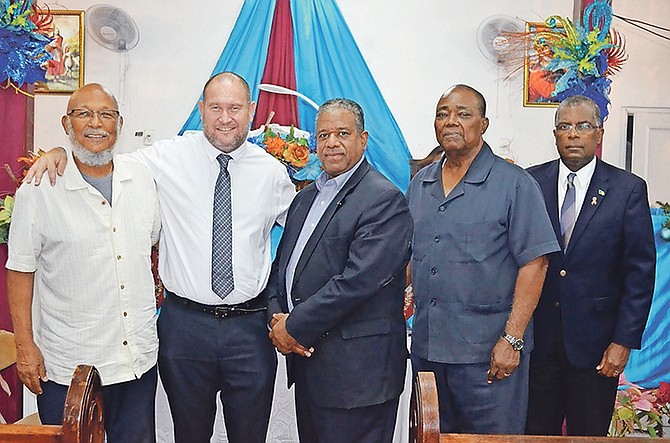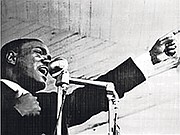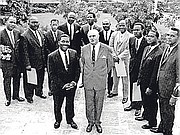From left, human rights activist Joseph Darville, University of The Bahamas Professor Christopher Curry, former Senator Philip Galanis, Rev. Dr CB Moss, and former Member of Parliament Frederick Mitchell
By Felicity Darville
The month of January is a powerful one when it comes to remembering what unifying as a people and working towards a common cause can bring. Majority Rule Day and the Martin Luther King holiday were commemorated this month. Abroad, the Civil Rights Movement is well-known and its message is clear. Dr King got some of his inspiration right here in The Bahamas. He spent time living in Bain Town with like-minded colleagues when he visited here. He is said to have written his I Have a Dream speech here. But when it comes to Majority Rule Day, do we have a true understanding of what it means and have all Bahamians accepted it as belonging to them?
The Bain Grants Town Advancement Association (BGTA) celebrated the 52nd anniversary of Majority Rule this month under the topic: “Majority Rule Day was to represent a “revolution” in the political, economic and social orders of The Bahamas. The question today is what has happened to the revolution? Is it on course, been retarded or aborted?” In a lecture at Mt Olive Baptist Church moderated by Rev Dr CB Moss, the topic was addressed by former Senator Philip Galanis, Professor Christopher Curry of the University of The Bahamas and Grand Bahama human rights activist Joseph Darville. The BGTA kept the tradition of honouring the day alive long before it became a national holiday three years ago. The annual event, held in the community for many years whether well funded or not, was important to the residents, according to Rev Moss.
“We take great interest in participating because this (Bain Grants Town) was the epicentre of activities, where most of the rallies, demonstrations and church services took place at either Windsor Park or Southern Recreation Grounds,” he pointed out. “So Majority Rule Day is a legacy for us. Most of the major personalities were either born here or were deeply involved here (in religious, business, political, cultural and sporting enterprises) for many years. The leaders of the Women’s Suffrage Movement for the most part were from here. So over the years we have taken a delight in leading events. Like the Rt Hon Marcus Garvey said, ‘A people without the knowledge of their past history, origin and culture is like a tree without roots’. Linking the past to the present is important for us. We as Bahamians do not have a strong sense of our history.”
The Bahamas was known as a British Crown Colony since 1718. Shortly after the American War of Independence, British loyalists moved to The Bahamas, thus strengthening the British tie to the islands. By the 1950s political parties were forming, giving hope to a more local autonomy that would then come into effect in 1964. On January 10, 1967, the Progressive Liberal Party led by Lynden Pindling and the ruling United Bahamian Party led by Sir Roland Symonette both won 18 seats. Later, Randol Fawkes would decide to side with the PLP, thus enabling majority rule for the first time in our history.
A part of understanding that history is recognising and accepting this is an historic event all Bahamians should be proud of and celebrate, Rev Moss believes. He wants to see the day move away from being perceived as a Progressive Liberal Party (PLP) victory, when really and truly it was one the PLP and the Free National Movement (FNM) should celebrate.
“Over the years, Majority Rule Day has been viewed as a divisive event, one that divided the people politically, racially and otherwise,” he said. “In truth, majority rule should have been a day that brought the people together. It was achieved under the PLP, for which we are grateful and we congratulate them. But members of the party, following its attainment, embraced it as if it belonged to them. To exacerbate the problem, the founding members of the FNM, major players in majority rule, ceded it to the PLP. People like Sir Cecil Wallace-Whitfield, Elwood Donaldson, Warren Levarity and Maurice Moore. When they were PLPs, they fought shoulder to shoulder to bring about change. A couple of years later, they split off and did not retain their claim to that significant event. So for years, members of the FNM didn’t want to hear the name ‘Majority Rule’, and the whites looked at it as a day that belongs to the blacks and that idea extended even to Independence. By the mid 1990s no-one was really celebrating it. In 1994 BGTA decided that we will keep it alive and for a time we were the only ones doing it and we kept the name alive… until 2013 when we engineered the first national observation of majority rule (PLPs and FNMs, as well as other party representatives, the religious and civic sectors participated). Going forward, it is a day that should be embraced by all.”
Prime Minister Dr Hubert Minnis said as much: “Majority rule belongs to all Bahamians. We should celebrate this day as one Bahamas, as one people united in one love and service to our Commonwealth.”
What has happened to the revolution? Former Senator Philip Galanis addressed this during his commentary during the 50th anniversary and echoed it during the lecture at Mt Olive: “Today the chasm separating the majority from those who have won their vote is larger than ever. Unlike yesteryear when the people were an integral part of the lives of those who represented them so that they could better speak on their behalf, today many of those who govern do not interact with the majority of the people to stay in close touch with their goals and aspirations. Today it is almost as if the governed and the governing were not two parts of a whole but more like two separate entities with two different agendas.
“It is sad but true that neither of the recent administrations would make their antecedents proud that they have raised us to new heights. Unfortunately, they failed to build on the dream of the first fathers of freedom to enhance Bahamian ownership of our economy.
“While we have achieved majority rule in the political sphere, we are disappointingly far away from economic independence and ownership. This could have been achieved had the inheritors stuck to the script that was drafted by the first fathers of freedom and overwhelmingly approved by the voice of the majority, first at that election of 1967 and then at subsequent polls.”
Looking at majority rule as a Nassau-centric event is also a misconception, according to Professor Christopher Curry. During his presentation, he gave a Family Island perspective. Thinking of Nassau initially is understandable, he said, given the dramatic events that unfolded in the capital including the Burma Road Riot, General Strike and Black Tuesday.
“Unfortunately, this narrative obfuscates the importance that the Family Islands have played in the unfolding Quiet Revolution—a term that Doris Johnson so aptly coined in describing the political changes that occurred between 1942 and 1967,” Curry said.
“In order to understand the importance that the Family Islanders played in the Quiet Revolution, we must first explore the political, social and economic backdrop of these islands and their communities—the ways in which they suffered tremendous degradation, exploitation, marginality, underdevelopment and social inequality. It was indeed these conditions that led common people in the far flung islands of The Bahamas to stand up and challenge the oppressive system.”
He spoke on the strong delineations of race back then on the islands – all white settlements like Spanish Wells and Hope Town; all black settlements like Matthew Town and Rolleville; and “bi-racial bifurcated” towns like Green Turtle Cay, Marsh Harbour and Harbour Island. He spoke on the polarisation of race and uprisings - like violence in Harbour Island in 1860 when whites wanted to build a new cricket ground on land used by blacks for truck farming; in 1885 when five coloured men tested the custom that whites enter the Methodist church by one door and non-whites by another; and the 1937 riot in Inagua when racial tension exploded into violence.
Speaking specifically on majority rule, Curry pointed out: “George Thompson played a crucial part in achieving the 18 count for the PLP. Mr Thompson, a black man, was a former UBP who had fallen out with his party. He was popular in Eleuthera and delivered two seats - his and Preston Albury’s - to the PLP. Without him, the PLP would have lost. Alvin Braynen, (Harbour Island) was identified with the Old Guard UBP but was feuding with them at the time and so he ran as an independent candidate in 1967. It is doubtful that Sir Alvin was motivated by any strong belief in what the progressives had been advocating. More likely he was motivated by revenge or personal ambition. He threw in his lot with the PLP and accepted the post of Speaker of the House.
“Another little-known factor in the PLP’s performance was that Sir Lynden had to be persuaded to run in the Kemp’s Bay (South Andros) constituency against the popular Cyril Stevenson. Mr Stevenson, a founding member of the PLP, left the party in 1965 over the mace incident and the party’s boycott of parliament. He did not join Paul Adderley’s NDP but ran as an independent. Sir Lynden was reluctant to leave his safe seat in New Providence but his NCPA friends rightly judged that he was the only PLP candidate who could defeat Mr Stevenson. Sir Lynden won and continued to represent Kemp’s Bay until he left the House in 1997.”
Human rights activist Jospeh Darville warned that “the curse of enslavement still hangs around our necks”.
“For fear of retribution, many, too many of us, cling to the old vestiges of the plantation,” he said. “Our masters now, only having changed colour and having elevated themselves to the status of demi-gods, have so fine-tuned their capricious power and control over us, that mental enslavement has become their special art. Thus, our promised land is nowhere even on the horizon. My lamentation is that we are more enslaved now under our own native leaders than we were under our white slave masters.
“In such a state of affairs, one can conclude that the state of human rights in this nation is defunct, not even in ICU, but in rigour mortis, having for too long under gone the rites of extreme unction (last rites). Sadly, we have yet to see the birth of real freedom in this land. As a matter of fact, if what has been now called the Spy Bill had been passed, our individual freedom especially of privacy and public utterances would have been drastically curtailed, if not totally abolished. It would have indeed further shackled our most precious gift of freedom to express. Essentially, we have gotten rid of one set of slave masters and embraced another; and that ‘another’ is even more pernicious. For when our own - knowledgeable about every iota of our psyche -enslave us, they do so with even more vengeance, for they have fine-tuned the technique of psychological enslavement as an art.
“We do not need a revolution, not even a silent one. We need an evolution of consciousness and an awareness of our greatness, something we seemed to have missed over 52 years of so called majority rule and some 46 years of political independence.”








Comments
SP 5 years, 2 months ago
"Majority Rule Day" is all bullshyt! The majority does not rule anything, own anything or make any decisions.
Just more political bullshyt for braindead idiots!
Gotoutintime 5 years, 2 months ago
As far as I'm concerned it was better when we were British!
OldFort2012 5 years, 2 months ago
The uneducated and ignorant cannot be truly free. They can just be told they are free.
joeblow 5 years, 2 months ago
A minority used the majority to create new oligarchies for a minority. That minority continues to rule!
Well_mudda_take_sic 5 years, 2 months ago
The slavery we are experiencing today under black majority rule is actually proving to be much worse for the greater majority of Bahamians than the slavery of yesterday under white minority rule. That's the very stark and harsh reality most of us Bahamians are only now waking up to. LMAO
sealice 5 years, 2 months ago
but the floral shirts you get to wear over your chains makes it all better right?
K4C 5 years, 2 months ago
Did We Deliver Then Betray The Dream ?
All one has to do is walk on Bay Street to get your answer
sealice 5 years, 2 months ago
the article in the guardian about all the trash downtown would say YES! ever since we have become Bahamian the country has continued in a downward spiral that increases with every election cycle and another lot of politicos out to line their pockets.
DDK 5 years, 2 months ago
Majority Rule Day is quite simply an effort to secure and maintain the votes of the plebiscite.
The article contained much information and many views on days gone by as well as days current!
Sign in to comment
Or login with:
OpenID